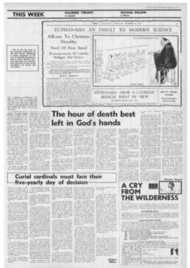Page 3, 26th January 1973
Page 3

Report an error
Noticed an error on this page?If you've noticed an error in this article please click here to report it.
Tags
Share
Related articles
Bishops On Abortion
Abortion Discusses Leg,
How The Mandarins Of The Doh Destroyed Medical Ethics
Opposition Grows To Liberalisation Of Abortion Policy
Pastor Iuventus
The hour of death best left in God's hands
It is undoubtedly true that the Abortion Act passed through Parliament principally because Christians and others who were against the legatisation of abortion were persuaded that it was not their business to interfere in a matter concerning the law of the land.
Secondly, it was because we believed the abortionist campaigners when they assured us that the last thing they wanted was abortion on demand.
When we listen to those who are campaigning for euthanasia many of us are determined that we shall not fall into the same trap twice. One recognises, of course, that many people who would like to see "voluntary" euthanasia legalised are perfectly sincere and truly compassionate.
They feel pity for the senile, the helpless and the incurably sick; it is this sense of real compassion that inspires their desire to see euthanasia legalised.
An attempt to evaluate the position objectively will always be difficult. simply because euthanasia, like abortion, is an emotional subject–as is any matter of life and death.
So perhaps we might begin with the moral theologian's position. Fr. John Mahoney. a Jesuit who lectures at Heythrop College, has this to say: "So far as the probletr.»f today are concerned, what we have to do is to find a middle way between what some people call vitalism'–the idea that wherever a spark of human life exists it must be preserved at all costs–and. at the other extreme, the idea of 'voluntary' or involuntary euthanasia.
"Many people think that `vitalism' is the Catholic position, but it is not.
"It is not morally permissible to do anything which will directly bring on death. At the same time, patients have a right to die. It is not necessary to continue to prolong the process of dying. Once a doctor has identified the process of dying, there is no obligation to prolong this process."
Fr. Kevin Kelly, writing for the ' Catholic Truth Society, says: "It is essential that the attitude of Catholics with regard to euthanasia should stem from a genuine respect for human life and the human person.
"Outside of this context their approach can very easily degenerate into a .cold legalism. To oppose euthanasia without being committed to care and concern for the human living of those
for whom it js being claimed that death is a mercy can hardly be called true Christian love."
It must be stressed that it is not only Catholics, or indeed only Christians. who are opposed to euthanasia. The conference in Westminster Cathedral Hall stems from an approach to Cardinal Heenan by two doctors, both deeply involved in the care of the incurably sick.
One is a Quaker, one an Anglican. At the conference will be representatives from the Council of Christians and Jews and from the Archbishop of Canterbury.
Present in person will be the Moderator of the Free Church Council and Bishop Huddleston of Stepney. There will be representatives of the Moderator of the General Assembly or the Church of Scotland, and of the Archbishop of Wales. An expression of support has been received from the Mufti of the Moslem community in this ,couniry; the Koran expressly forbids euthanasia.
The arguments against permissive euthanasia legislation are strong enough to stand on their own without appeal to the religious ethic. There is the all too real danger of escalation.
Currently, all the pressure is for "voluntary" euthanasia, any hint of anything further being considered too much for the public stomach to take at the moment.
But how "voluntary" is legalised euthanasia likely to be? If an old or incurably ill person is aware that he has the right to opt out of continued existence, it may well seem to him that it is his duty to ask for death in order to spare others the labour of caring for him.
Again, once we admit the right to choose, what do we do about those who are incapable of' choosing for themselves–the senile, the mental defectives, babies born deformed?
It is all too likely that we shall be expected to acknowledge that those who are more intelligent should make the choice for them. "Voluntary" euthanasia then becomes involuntary.
Once those whose lives have become a burden to themselves can be pot ,to death, it will be a very short step indeed to euthanasia for those whose lives have become a burden to society: psychotic criminals, for example, or people with undesirable political views. At that point we get back to the Nazis.
I talked to one of the doctors who originally approached Car dinal Heenan. to find out his views. He felt that it was significant that for the present all that is
being officially canvassed is euthanasia for those experiencing severe suffering in the course of a terminal illness.
"Euthanasia means killing a patient by his own request," he said. "It is not euthanasia to stop giving a treatment which is inappropriate. Refraining from starting treatment which looks hopeless is not euthanasia. Turning off a respirator is not euthanasia; it is a legitimate medical decision.
"The Pope has stated that it is not euthanasia to give drugs which, in controlling pain, might have the side-effect of shortening the patient's life.
"However, this is only of historical interest, because nowadays we can control pain without shortening patients' lives. This is the contribution which has been made by the hospices."
There are about two dozen hospices in this country today. They care for people of all ages who are suffering from terminal illnesses. Ii you imagine, as I did. that they might be places with an ir of sadness or tension then, like me, you will be completely wrong.
A man who told me he was suffering from cancer said: "I've been here ten weeks, and they have been the happiest weeks of my life. No one has to endure any pain. If someone dies they pass away so peacefully that you can hardly believe they've gone."
Every window sill was bright with flowers, every surface that could he polished to a shine was gleaming. Everyone was cheerful both patients and staff.
A wife sat by her husband's bed, his hand in hers. He was unconscious but breathing peacefully. She told me without distress that he had been in the care of a London hospital for some years. "They did everything they could.
"They wanted him to come back again for more treatment. But there comes a point when you have to say 'that's enough'. I didn't want him to have to go through any more. I feel he has the right to peace now."
This is where we come back to the problem of "vitalism". Medical techniques have now advanced to the point where it is possible, one might almost say, to prolong life indefinitely through the use of drugs and mechanical apparatus.
But, just as there is a right to life, so is there a right to death. One member of the conference committee, who represents the over-65s, said: "What people do not understand is that your out look on life when you are reaching the end of it is quite different from at the beginning.
"I have discussed this with a lot of my contemporaries. We don't want to go today or tomorrow or next week; but we don't mind if we do–if our time has come. that's that.
"We shall be happy if hypostatic pneumonia, Osler's 'Old Man's Friend', also called the `Natural End of Man', may be allowed to develop, relieved but unchecked, so that we can die in peace and dignity, with a very real gratitude towards those who have refrained from exercising their power to postpone natural demiathhaitn it omolcdagees. "down to in the end is that. like all the processes of our living, "the hour of our death" is best left in the hands of God. When man attempts to assume God-like powers. whether in prolonging life or in shortening it, disaster is bound to follow.
Society is being much less than fair if it expects the medical profession. trained to venerate human life, to take on these appalling decisions. What one general practitioner said to me sums it all up: "The day 'voluntary' euthanasia is legalised, the' day I see my old patients look at me with fear in their eyes instead of hope, will be the day I give up the practice of medicine."
blog comments powered by Disqus











